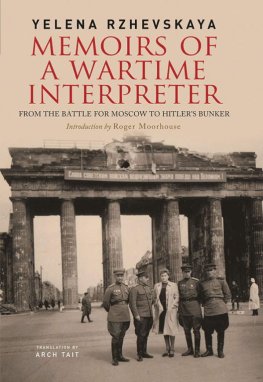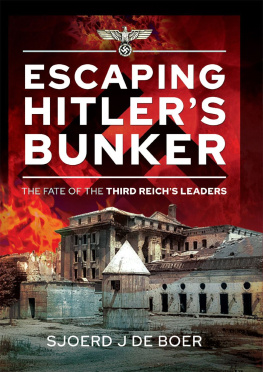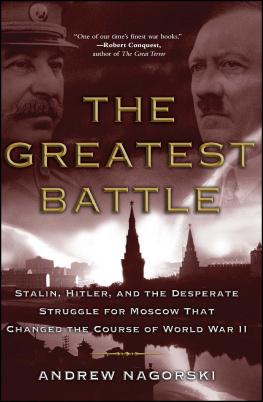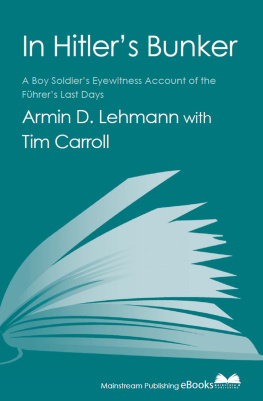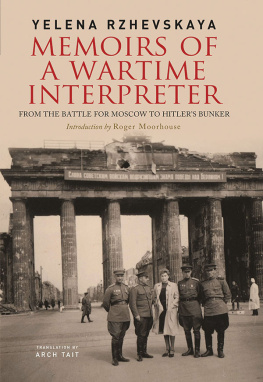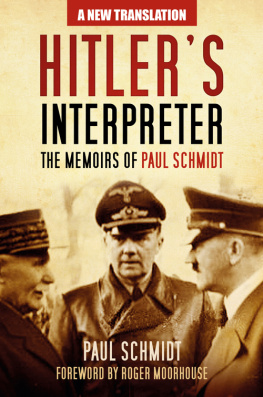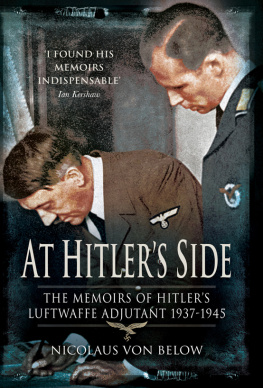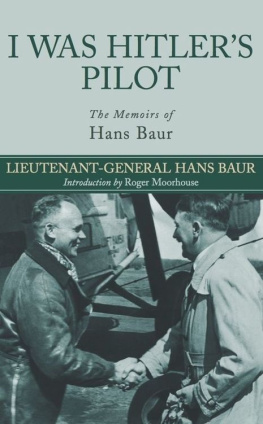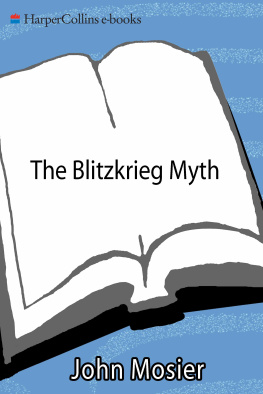Yelena Rzhevskaya
MEMOIRS OF A WARTIME INTERPRETER
FROM THE BATTLE FOR MOSCOW TO HITLERS BUNKER
Translated by
Arch Tait
Foreword by
Roger Moorhouse
This is the story of the war as I saw it, from the battle for Moscow to the last days in Hitlers bunker, and Stalins efforts to rewrite history to his own ends.
I am profoundly grateful to Yelena Kostyukovich, who took this book to an Italian publisher and kept an eye on how it was faring, just when her own amazing book, Food: Italian Happiness, was being published to international acclaim (and meeting with great success in Moscow). She continued with unflagging attentiveness to advise and comment on my book during its final stages.
Thank you also for help and support as I worked on the book to my friend and discussant, my granddaughter Lyuba.
Yelena Rzhevskaya in early 1942, near the start of her military service.
Rzhevskaya in 1943.
The German swearing dictionary, from Rzhevskayas interpreters course.
Rzhevskaya and comrades relaxing near the front in the winter of 19423.
Rzhevskaya and female comrades, May 1943.
The photo of the theatrical performance in the French POW camp given to Rzhevskaya, and its inscription.
Marianna and Alfred, the unfortunate couple in Bydgoszcz that Rzhevskaya tried to help.
Rzhevskaya and a group of Soviet officers amid the Berlin ruins.
Rzhevskaya and friends at the temporary Soviet victory columns in Berlin.
A tall German policeman, Rzhevskaya, and a diminutive Soviet traffic officer.
Rzhevskaya sightseeing in Berlin, with a German gun in the Tiergarten, in the government district, and at the Bismarck memorial in the Tiergarten.
The Goebbels post-mortem.
The conclusive diagram of Hitlers teeth.
Dental assistant Kthe Heusermann and dental technician Fritz Echtmann in Soviet hands.
Rzhevskaya in the garden at Finow shortly before she was demobilized.
Rzhevskaya speaking in 1986 at a conference in memory of Marshal Zhukov.
All images the estate of Yelena Rzhevskaya.
When Yelena Rzhevskaya joined up in the autumn of 1941, she could have had little inkling of the role that she would eventually play in the history of the twentieth century. A young literature student, studying at Moscow State University, she initially worked in an armament factory, then trained as a nurse, before her knowledge of German caused her to be sent for instruction as a Red Army interpreter. A couple of months later, armed with a pocket dictionary and a notebook, she was dispatched to the front.
The world into which she was sent was almost completely alien to her: a dystopia of murderous combat, destitute refugees and seemingly endless ruins, in which she had not even been trained to use a gun. Her journey took her westwards through Rzhev the infamous meat-grinder, west of Moscow, which was finally liberated in March 1943, and in whose honour she took her nom de plume via Warsaw and on to Pozna, where she arrived in the opening months of 1945.
Her primary task throughout was the interrogation of prisoners; often of squealers German sentries snatched from their posts by Red Army patrols, to be pressed for information. Most of them, she said, were little more than frightened boys. Her account, which brims with contemporary material from captured German field-post letters to official documents and extracts from her own diary is beautifully and engagingly written, and full of wonderful vignettes of those caught up in the fighting or in the chaos of its aftermath. Throughout, Rzhevskayas humanity, her sympathy for the ordinary people thrown into the maelstrom of war, stands out.
This human sympathy, coupled with Rzhevskayas elegance as a writer, would have made her account memorable even without her participation in world-changing events. But, participate in them she did. In April 1945, she was transferred to the Soviet 3rd Shock Army, then poised for the final assault on Berlin. After fighting through the northern suburbs of the German capital, on 28th April units of the 3rd Shock Army crossed the Moltke Bridge in central Berlin, and began storming the Reichstag, decreed by Moscow to be the symbol of Nazi German power. The real seat of Nazi power; the Reich Chancellery, was barely 200 metres distant, and Soviet forces with Rzhevskaya in their train arrived there on 2 May. There in what remained of the Reich Chancellery garden she would be one of only a handful of people to see the corpses of both Josef Goebbels and Adolf Hitler. It would become the defining experience of her life.
Brought in to interpret for the small team trying to establish the identity of the charred corpses that were found in the Chancellery garden, and by extension investigating the circumstances of Hitlers death, Rzhevskaya found herself for a few days at least at the very epicentre of events. While the world pondered Hitlers fate, she was busy collecting and translating documents that had been taken from Hitlers bunker and interviewing those who had witnessed his final days. She was even put in charge of the remains of Hitlers teeth rescued from his shell-hole grave which were placed in a lined jewellery box for safe keeping. They were entrusted to her, it is thought, because she was considered less likely than her male counterparts to get drunk and mislay them.
Those teeth would prove decisive in identifying the corpse as Hitlers. Heavily dentured having suffered from poor teeth for most of his life Hitler had very extensive and distinctive dentistry; consisting of dentures, bridges and crowns, as well as his own few remaining teeth. A priority for the investigators, therefore, was to find Hitlers dentist Hugo Blaschke or any of the team that had worked with him, to aid the identification. Though Blaschke himself had fled to Bavaria, Rzhevskaya and her group of investigators tracked down his assistant, Kthe Heusermann, in Berlin, who confirmed that she had indeed worked on Hitlers teeth many times. She sketched his bridges and crowns from memory, matching perfectly the teeth in Rzhevskayas jewellery box. And, when she was finally shown them, Heusermann confirmed: These are the teeth of Adolf Hitler.
Yet, just as Rzhevskaya was expecting the crowning evidence of the identification from the post mortem word arrived that the Soviet press in Moscow was already reporting that Hitler might have escaped to Spain or South America. Our troops, she said were suddenly being urged to Hunt for Hitler It was a deceitful charade, a weird attempt to disguise the fact that his body had been found. She did not yet know it, but she had fallen foul of Stalins mendacious desire to use the spectre of Hitlers survival as a stick with which to beat his erstwhile allies. With that, she wrote, Hitler was no longer an emblem of the war, he became an emblem of the kind of peace that was to follow. Her investigation would thereby be rendered null and void. And all those witnesses who had assisted her, including Heusermann, were consigned to the prisons of the Soviet secret police, where they would be endlessly interrogated in an attempt to persuade them to collude in the lie of Hitlers supposed survival and escape. It was all part of a colossal task of deception and disinformation that would even be given its own title: Operation Myth.
Returning to the Soviet Union after the war, Rzhevskaya shared the disappointments of many former soldiers: the dashed hope that victory might presage a loosening of the iron grip of Stalinism, and the wistful yearning for the excitement and sense of meaning that military life had brought with it. In her case, however, her frustrations were amplified by her enforced silence on the most important event of her life; a mere interpreter would have been profoundly unwise to have contradicted Comrade Stalin, especially on a matter as important as the death of Hitler. Consequently, it was not until the 1960s, more than a decade after Stalins death, and two decades after Hitlers, that the first edition of her memoir

